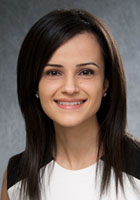For 90 minutes every other week, about a dozen people share a small, comfortable space and talk about their cancer. They talk about how it felt to learn of their diagnosis, they talk about wrangling with insurance companies, they talk about the next round of treatment, they talk about their fear that remission may end. And as they talk, as they listen and share and find commonality in each other’s stories, something remarkable happens: they get better. Their tumors may not recede and their co-payments may not reduce, but under the guidance of a trained psychiatrist and psychologist, the participants feel less alone, less depressed.

That was the goal of Dr. Arwa Aburizik when she designed the group psychological interventions in the Holden Comprehensive Cancer Center more than a year ago. Dr. Aburizik is a psycho-oncologist with dual training in Internal Medicine and in Psychiatry. In research and in conversation with other institutions, she had found that tackling the psychosocial challenges that arise with cancer could improve a person’s quality of life. Studies have shown that group therapy in cancer patients helped to diminish fatigue, anxiety, and depression. A variety of therapy styles including meaning-centered, supportive-expressive, and acceptance-commitment therapies (ACT) eased existential distress in patients with advanced cancer.

After resolving some of the logistical challenges in establishing the group, Dr. Aburizik recruited Dr. JoAnna Cartaya, a licensed psychologist, to help guide the sessions. Each session begins with five minutes of guided relaxation exercise, and ends with five minutes of a mini didactic—typical of the ACT school. Alternatively, there could be some kind of reading—a poem or brief story with a learning point. The rest of the time is up to the participants, free to discuss whatever is weighing on them or has brought them joy. But Drs. Aburizik and Cartaya are on hand to steer the conversation, keeping the focus on acceptance of their disease and commitment to healing, in addition to other psycho-educational keypoints. “Stories stay, lessons leave,” Dr. Cartaya says of the sessions.
Although the members do as much or more of the work in the sessions, Dr. Aburizik is clear about distinctions. “This is not just a support group. This is therapy.” The focus, she says, is on providing participants with an environment and tools they can use “to manage the whole-person needs” during, and even after, the more familiar methods of cancer treatment like radiation and chemotherapy.
Eventually, as participation in the group grows beyond its 12-person limit, Dr. Aburizik hopes to begin forming groups that have deliberate and beneficial dynamics, based on ages, personality types, types of cancers, or stages of treatment. As she refines the group sessions, the members of the group practice a similar refinement, session by session.
For more information about group therapy for cancer patients, call 319-678-8167 or email HCCCTherapyGroup@healthcare.uiowa.edu.
One comment on “Talking It Through”